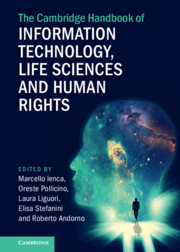Book contents
- The Cambridge Handbook of Information Technology, Life Sciences and Human Rights
- The Cambridge Handbook of Information Technology, Life Sciences and Human Rights
- Copyright page
- Contents
- Tables
- Contributors
- Acknowledgements
- Introduction
- Part I Life Sciences and Human Rights
- Part II Information and Communication Technologies and Human Rights
- Part III Towards a Convergence
- 18 Technological Changes and Rights Evolution in the Bio-digital Era
- 19 Human Dignity, Life Sciences Technologies and the Renewed Imperative to Preserve Human Freedom
- 20 Human–Machine Symbiosis and the Hybrid Mind
18 - Technological Changes and Rights Evolution in the Bio-digital Era
A Philosophical Overview
from Part III - Towards a Convergence
Published online by Cambridge University Press: 17 May 2022
- The Cambridge Handbook of Information Technology, Life Sciences and Human Rights
- The Cambridge Handbook of Information Technology, Life Sciences and Human Rights
- Copyright page
- Contents
- Tables
- Contributors
- Acknowledgements
- Introduction
- Part I Life Sciences and Human Rights
- Part II Information and Communication Technologies and Human Rights
- Part III Towards a Convergence
- 18 Technological Changes and Rights Evolution in the Bio-digital Era
- 19 Human Dignity, Life Sciences Technologies and the Renewed Imperative to Preserve Human Freedom
- 20 Human–Machine Symbiosis and the Hybrid Mind
Summary
Human beings are technical beings. Their lives cannot be accomplished without technique. At the end of modernity, the symbiosis between science and technique has become so tight that we can now speak of technoscience that gives us more power and responsibility than simple traditional techniques, as in the case of the new biotechnologies. In this chapter we offer a critical reflection on the two major anthropotechnical proposals, that is, the bio-project and the info-project and present arguments and criteria crucial to human rights development and their relevance for an adequate technological humanism. More concretely, we carry out a philosophical analysis of the importance of responsibility for safeguarding the duties of future generations and a non-dualistic anthropology. We also highlight the relevance of societal responsibility, care and solidarity in making the impossible detachment of human beings from technology an opportunity to develop a fruitful debate on human rights based on a deeper understanding of human beings’ relational nature.
- Type
- Chapter
- Information
- Publisher: Cambridge University PressPrint publication year: 2022
- 1
- Cited by

